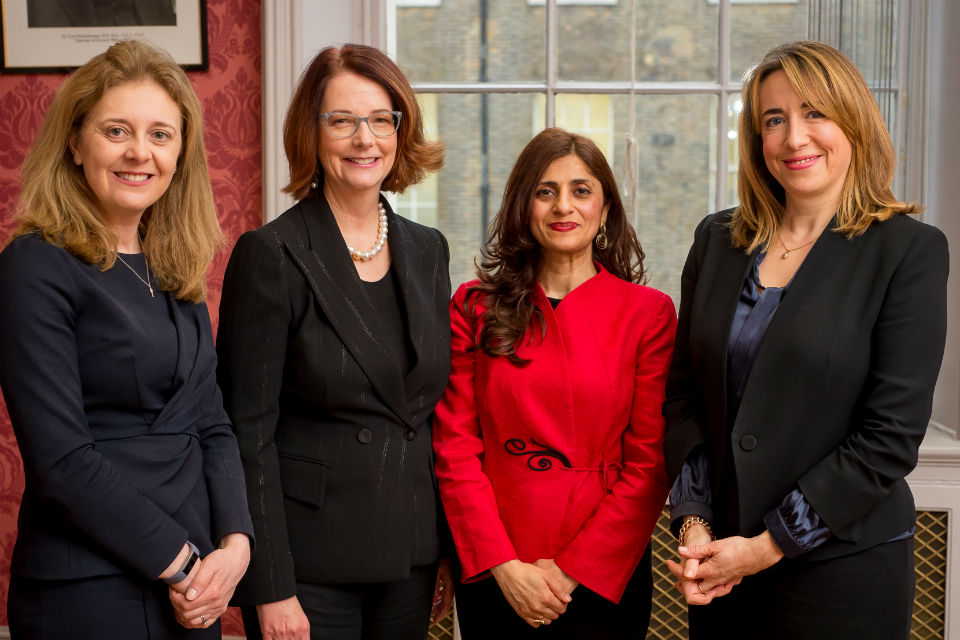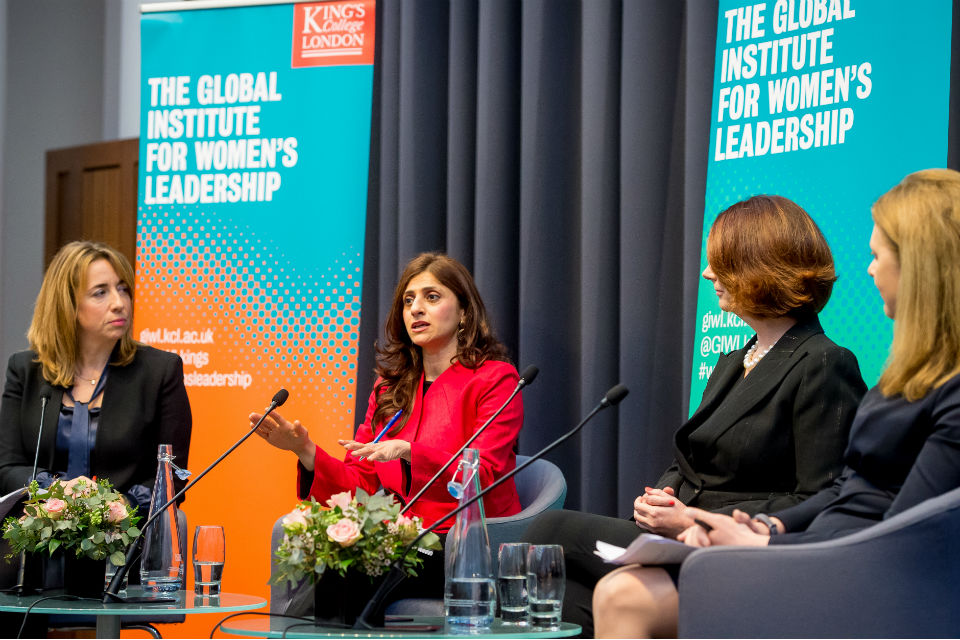Now is the time to be talking openly, honestly and collaboratively about women leaders, and what we can all do - men and women - to ensure the challenges facing current and future generations of women leaders are tackled and overcome.
This is why I joined a panel and audience discussion hosted by the new Global Institute for Women’s Leadership at King’s College London last month. My fellow panellists were former Australian Prime Minister Julia Gillard, Guardian Editor-in-Chief Katharine Viner, and Joanna Ludlam, a partner at international law firm Baker McKenzie.

I’m a Senior Civil Servant with a background in policy for the British Government, the United Nations and leading think tanks. My current team, the Race Disparity Audit, based in Cabinet Office, is wonderfully unique in many ways. Not the least of these is the fact that the Prime Minister commissioned us to develop the world's first government website highlighting disparities across ethnic groups. It is also unprecedented in transparency, scope and scale but also because, as a team of data, digital and policy experts, we are mostly women. We are led by an amazing and inspiring male director who champions the whole team and invites us to challenge him all the time.
Progress and work still to do
Civil Service diversity has come a long way in recent years, thanks to the strong leadership and support of the current Cabinet Secretary and Head of the Civil Service, Sir Jeremy Heywood. The top team of senior civil servants like me is 43% female - the highest ever. Over one-quarter of Permanent Secretaries are women, though, as yet, the UK has not had a female Cabinet Secretary, so there is still work to do.
Having worked for the UN for two years early in my career, in the desert of Darfur and the mountains of Nepal, I was highly accustomed to being challenged by my seniors and challenging myself to answer key questions such as, ‘Where are the women leaders in this programme?’, ‘How much of this funding will benefit women in education and leadership?’ and ‘What are the strategic outcomes here for women?’
What surprised me greatly was that, when I returned home to the UK, none of my senior leaders ever asked me these questions in my strategic policy roles. Do we somehow feel in the global north that we have achieved gender parity? Yes, we have some of the best equality laws in the world, but that does not mean we have the greatest outcomes for women, or the highest numbers of women leaders across sectors.
Whenever I asked ‘Why not women?’, the response would invariably be ‘look at the Scandinavian model’, where there is greater parity through impressive targets for women leaders in employment and progression. When I did so, I learned that, despite the targets, they also have low paternity leave take-up.

Changing behaviours, improving outcomes
As a proud ethnic and faith minority member of the Senior Civil Service, I feel the need to highlight also the importance of intersectionality (the principle that people are made up of multiple identities and characteristics that intersect with each other) and the reality that women from minority groups can face additional challenges in access, progression and being recognised in leadership roles. Sadly, I am still too often mistaken for the personal assistant, in various settings, no doubt because of my name and the colour of my skin, in addition to my gender.
We have, therefore, not yet fully leapt from putting in place the right legislation to actually changing behaviours to achieve better outcomes for women. What we want is regular open dialogue to help inform policy, programmes and funding decisions on the key issue of women leaders. This suggests the limits of laws in the global north, whereas, in the global south, often in the absence of laws, many countries are progressing organically to achieve gender parity and greater women’s leadership, and women are almost always ‘on the agenda’.
In the UK we are now having a much-needed debate on gender pay, triggered by legislation mandating large employers to publish their pay data. A lot of media reporting of this issue focused on ‘what women now need to do’ to secure pay bonuses or promotion, which is practical advice and necessary steps for women to take. However, sadly, from what I have seen, there is much less focus on what men should do or how they might step up to show leadership and commitment, and collaborate with women to address pay and other challenges.
I was also surprised to learn that in some companies with the highest pay gaps, women had previously cited their employers as being ‘female friendly’. This led me to question what we are measuring, what perceptions we have and what goals we are aspiring to.
Change perceptions
All of these issues highlight the continuing need to change perceptions and, above all, challenge behaviours. We can do this by: ensuring greater data transparency and accountability; increasing understanding of the reality of women’s leadership and delivery of progressive outcomes for women leaders; and, crucially, by showing what male leaders need to do to support this positive change.
We rightly should ask - Why did it require legislation for us to talk openly about the gender pay gap? We all need to ‘call out’ bias and challenge behaviour that is inappropriate and discriminatory. So, as Julia Gillard kindly suggested during the discussion: “Channel your inner Zamila” - and call it out!
We need to move forward together if we are to encourage, inspire and support current and future generations of women leaders, which will benefit everyone in society, not just women.
* Images reproduced courtesy of the Global Institute for Women Leaders, King's College London.

2 comments
Comment by Gary McDonagh posted on
"Now is the time to be talking openly, honestly and collaboratively about women leaders, and what we can all do - men and women - to ensure the challenges facing current and future generations of women leaders are tackled and overcome..."
Or to put it another way how can people, irrespective of gender, help other people, irrespective of their gender, thrive.
Comment by Melanie Ali posted on
Fantastic blog really resonated with me I will certainly be ‘ channeling my inner Zamila ‘ and championing all what you have said in your blog !